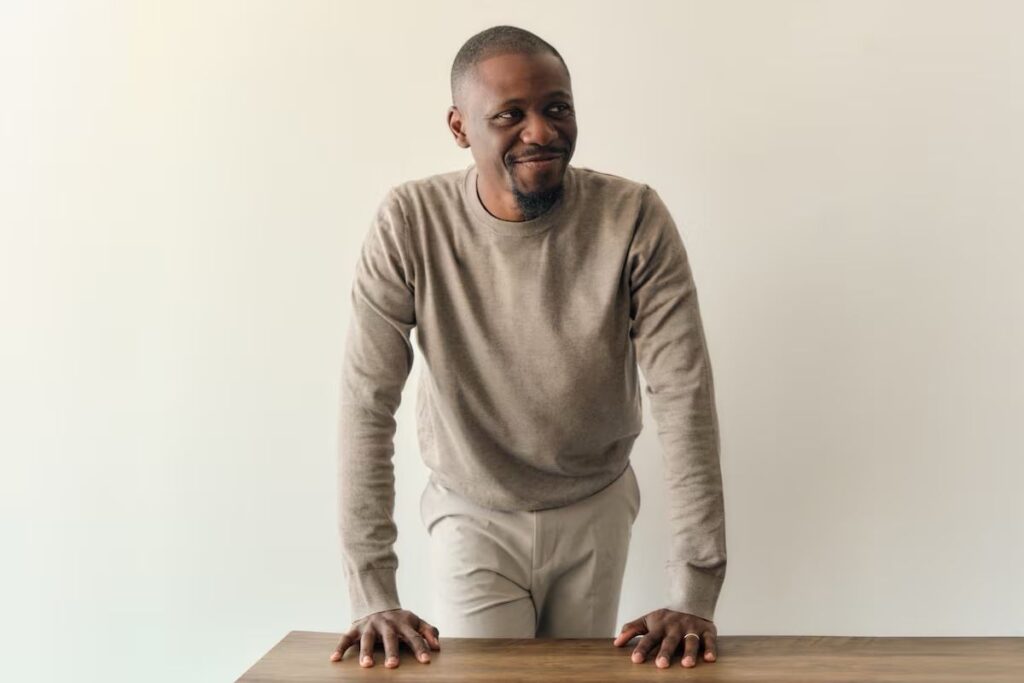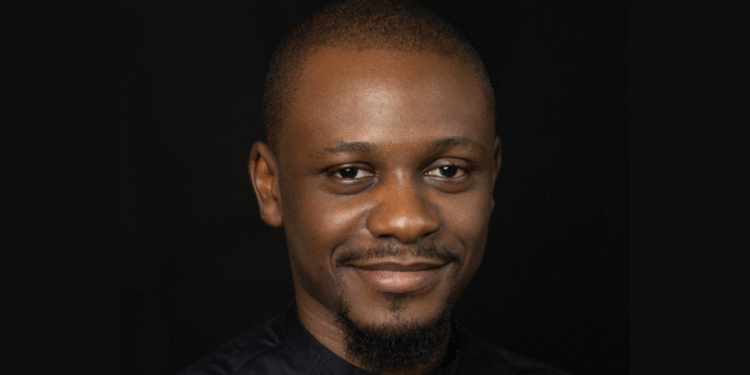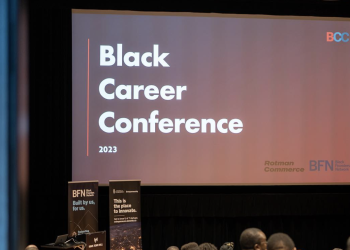Few leaders bring the unique combination of entrepreneurial experience, global perspective, and equity-focused mission that Yinka Adesesan brings. From launching his first business while still in university in Nigeria, to now leading Canada’s pioneering Black Innovation Programs at DMZ, Yinka’s journey spans three continents and multiple roles in the innovation ecosystem.
But this isn’t just another founder-turned-investor story. Yinka’s path from entrepreneur to technology educator to program manager to ecosystem builder reveals crucial insights about what it takes to design startup programs that actually work, and avoid what he calls “innovation theater.”
In this conversation, Yinka shares insights about thinking globally as a black founder, the critical difference between busy programs and impactful ones, and why so many startups become “zombies” despite having products and winning pitch competitions. For anyone building or participating in innovation programs, or simply trying to understand how to scale real startups—his perspective offers both strategic frameworks and practical wisdom.
Q: Your experience spans Nigeria, Spain, and Canada. How has working in different cultural contexts shaped your approach to innovation and entrepreneurship?
Yinka: Well, I think exposure is super, super good for a founder because it opens your mind to possibilities that go beyond what you’re used to. It’s not just about what’s around you. You get inspired by things outside your normal environment.
For me, that was one of the biggest things. It gave me a global perspective on building a business. When I first left Nigeria and started traveling, my mindset was still very much focused on solving Nigerian problems. But then I realized there’s a whole world out there, even beyond Africa.
When you begin to live and work in different countries, that global perspective becomes part of your thinking. Now, when I talk to founders, especially African founders, I encourage them to think bigger. I always say: anchor your ambition in dollars. Don’t limit your thinking to your local currency or environment.
That’s something I really believe African founders need to hear more often.
Q: You’ve played various roles — technology educator, program manager, leading accelerators. What inspired your transition into venture building and program management for startups?
Yinka: When I was in university, I started a couple of businesses. The first was a T-shirt making business. A few friends and I stumbled into it, and it turned out to be pretty successful. We ended up handling large-scale contracts for conferences and top schools across Nigeria.
That was my first experience creating economic value through business, and it stuck with me. After that, I started another company, a digital agency that’s still running in Nigeria today. We offered services to small and medium businesses.
All of this happened before I even graduated from school. I was just really drawn to the idea of building things people were willing to pay for. Back then, it was mostly about making money, but it felt empowering to create value like that. Those businesses were foundational. They shaped my entrepreneurial mindset.
So while I was working at the agency called Creovativ, you know, I worked with a lot of small to medium businesses. Mostly non-tech. They’d come for branding or website design, but I started noticing that many had gaps in their thinking. Even though I wasn’t in their industries, I could see where things didn’t make sense.
After I graduated from school, I I also started working as a technology educator, mainly to have a steady income while still running the agency. That job changed everything. I fell in love with tech, spending years immersed in the ecosystem, learning tools, and teaching students how to use technology to build meaningful things.
That’s when I saw the potential. Technology is a lever that lets you do a lot with very little. I began thinking: if I could bring that mindset to the founders I was already helping through my agency, it could be powerful.
Later, I got the opportunity to go abroad, to study at one of the top design schools in Europe. I studied design management, which is essentially an MBA combined with design thinking. That’s where I really got grounded in innovation and program management.
Since then, I’ve worked in different parts of the innovation space. First, with what I call “B2C innovation”, which is working one-on-one with early/idea-stage founders. I’ve also worked in corporate innovation, helping Fortune 500 companies launch accelerators and innovation challenges. Now, I’m at DMZ, leading systems and programs that help startup founders thrive.
Q: You’re now leading Black Innovation Programs at DMZ. What are the goals of this initiative, and what sets it apart from other accelerator programs?
Yinka: First of all, what sets us apart is that when the Black Innovation Programs at DMZ launched in 2019, it was the first incubator program for Black founders in Canada. So, in a way, we were pioneers.
The entire reason for starting the program came from recognizing a huge opportunity gap within the Black community. The Executive Director of DMZ and a few allies of the incubator identified that this was a community full of latent potential. A group capable of generating serious economic value, but without the support or visibility they needed.
The main goal was, and still is, to bridge that opportunity gap, understanding that Black founders in Canada are often not starting at the same place as other groups. Many of them, almost half, are immigrants who arrived within the last three to five years. They don’t have significant networks, they don’t have strong credit histories, and they often lack access to the economic infrastructure needed to launch and grow a business.
So the Black Innovation Programs by DMZ were set up to support these founders, not just with educational programming, but with direct financial support too. So far, we’ve invested $1 million directly into the pockets of Black founders and facilitated approximately $3 million in grants. That includes support for legal work, product development, and tactical business needs — anything that helps these founders move forward.
That’s the mandate. The mandate is to bridge that gap. Since the time we launched, we’ve seen other organizations come up, like BFN and BA and the rest here in Canada that are also supporting folks in the black community. And honestly, if we all succeed, then we wouldn’t need to exist anymore. Because then, the playing field would be level, and everyone would have equal footing in the market.
But the truth is that with immigration, we know that gap will persist for a while. So for now, we’re here to fill it. More people are coming in. New challenges will always arise.
Q: Your profile shows you’ve managed end-to-end execution of accelerator programs — from onboarding to delivering mentorship. In your view, which stage is the most challenging, and how do you navigate it?
Yinka: I’d say program design is the most challenging stage. But to be more specific, it’s the most complex and strategic part. That’s where you’re laying out a system that affects not just the program, but the organization, the startups involved, and the wider ecosystem.
You’re essentially engineering a complex system, and if you don’t do it intentionally, you end up with wasted energy. Something we call “innovation theater”, where you’re busy, but not impactful.
So, being very intentional about the outcomes you’re looking to get in a program is what would make the program design aspect the toughest part. You have to be clear about your desired outcomes, who you’re solving for, what your value proposition is, and how to communicate it. Once that’s solid, the next big challenge is startup recruitment — finding the right founders and convincing them to join your program.
After that, the rest becomes more operational. The execution, onboarding, and day-to-day program delivery are relatively straightforward, especially if you’ve worked in program management before. But these two stages — designing the right programs, and recruitment of startups and convincing them to join your program, are where the real work is.

Q: How do you measure success? Are you more focused on funding raised, business growth, or community impact?
Yinka: It depends on the program. I’ve worked across many different types of programs, from corporate innovation to early-stage founder support, and each one has its own definition of success.
For example, in corporate innovation, the goal might be to see how well a new idea gets embedded within the organization. But if you’re working more with what I call B2C innovation, which is directly supporting startups — the metrics are different. It depends a lot on the stage of the founders you’re supporting.
At DMZ, for instance, our incubator program supports startups at what we call the “scale stage.” These are founders who already have a product and some early customers. So success here is about real traction. We look at metrics like:
- Monthly recurring revenue (MRR) — Can we help you grow from $10K to $100K+?
- Customer growth
- Revenue increase
- Fundraising capacity — which is influenced by traction and valuation.
We want to see that delta — the change from entry to exit. How much progress did a startup actually make? That’s the metric that matters.
Now, for earlier-stage programs — like ideation or pre-product — success is more about encouraging action. How many people took the leap to start something? How many went from idea to prototype or MVP?So yeah, it’s a nuanced question. But in general, I believe the most fundamental thing to measure is impact delta — how many lives or businesses have changed economically because of your program. That’s what truly matters.
Q: Looking at Toronto’s ecosystem, what unique advantages or challenges do you see for underrepresented founders? How do you see DMZ addressing them?
Yinka: Honestly, the challenges are very similar across the board. Whether I’m at a conference or mentoring founders, I hear the same story.
The big issue I see is that many startups aren’t making real progress. I talk to founders who’ve spent months building something, they launch, and then, nothing. No traction. No users. Just silence.
A lot of these companies turn into what we call “zombie startups” — they have a product, maybe they win a pitch competition or two, but they don’t have any actual customers. No real business.
It’s a pattern in our community — especially among underrepresented founders — and it’s a tough one. That’s why, under my leadership at the Black Innovation Program, we’re shifting focus. We’re asking:
- Are founders solving the right problem?
- Are they leveraging their unique background or experience?
- Are they putting energy into something that actually delivers value?
If you’re not solving a problem you’re well-positioned to tackle, then you’re likely wasting effort. We want to stop that cycle and help founders launch properly — with clarity, support, and a product that truly fits the market.
To Wrap Up
Yinka Adesesan’s journey illustrates a fundamental truth about innovation: the most impactful ecosystem builders are often those who’ve experienced the challenges firsthand. His evolution from university entrepreneur to leading one of Canada’s most important equity-focused innovation programs offers a blueprint for others looking to create meaningful change in startup ecosystems.
The insights he shares—from encouraging African founders to “anchor their ambition in dollars” to avoiding the trap of “zombie startups”—reflect years of hands-on experience building and scaling programs that deliver real results. His emphasis on measuring “impact delta” rather than vanity metrics, and his focus on helping founders solve problems they’re uniquely positioned to tackle, provide a framework for program design that goes beyond surface-level engagement.
Perhaps most importantly, Yinka’s work demonstrates that building inclusive innovation ecosystems isn’t just about equity—it’s about unlocking economic potential that benefits everyone. As he puts it, if programs like DMZ’s Black Innovation Programs succeed in leveling the playing field, they’ll eventually make themselves obsolete. That’s not just good program design; it’s visionary ecosystem building.
For founders, program managers, and ecosystem builders, Yinka’s story offers both inspiration and practical guidance for creating programs that move beyond innovation theater to deliver real, measurable impact. His approach stands out for its intentionality, global perspective, and unwavering focus on results that matter.













